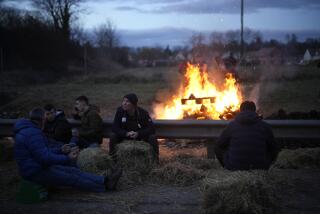Farmers Have Bone to Pick With ‘McDos’
- Share via
PARIS — Patrice Vidieu, who tends 75 goats in a green and tranquil corner of France’s countryside, has met the enemy of peasants like himself, and it is the McDonald’s hamburger.
In recent weeks, the maker of tangy goat cheese from Rocamadour and thousands of other small-scale French farmers have been giving the U.S.-based fast-food giant, symbol and agent of the invasion of Europe by American agribusiness and its techniques, a very rough time.
The construction site of a new McDonald’s in Millau, the main town of the south-central area that produces the blue-veined Roquefort cheese prized by gourmets, was trashed by militants of the Peasant Confederation, a radical rural group that Vidieu belongs to.
Other “McDos,” as the French have nicknamed the eateries with the golden arches, have been blockaded by farmers or had truckloads of rotting fruit and vegetables dumped in their parking lots.
In Pontarlier near the Swiss border, French farmers whipped up a fondue from locally manufactured cheese in front of a McDonald’s to remind patrons that there is more to life than Chicken McNuggets. In the town of Bergerac, a calf, chickens and geese were let loose inside the McDonald’s.
“This McDonald’s is just imperialism applied to food,” charges Vidieu, who doubles as the Peasant Confederation’s secretary-general and confides that he has never eaten any McDonald’s food himself. “We don’t want one of these restaurants on every street corner in France. Look at where giant agribusiness, this accent on yield at all costs, has gotten us--’mad cow’ disease, the dioxin crisis.”
In an ongoing, nasty fight over food pitting the United States against France and its European Union partners, McDonald’s has become the whipping boy in France for the Clinton administration’s decision to impose 100% tariffs on a range of European luxury edibles, including French-produced Roquefort, mustard, shallots and foie gras.
Never mind that McDonald’s says its 750 French outlets serve fare made from beef, potatoes and other ingredients that are 80% French and 100% European.
“The attackers at the Millau site picked the wrong target,” Denis Hennequin, president of McDonald’s France, protested after the Aug. 12 action.
Nevertheless, to try and calm things down, McDonald’s withdrew a criminal complaint it had filed against the Millau vandals.
The U.S. Embassy in Paris invited the French and other EU members to sit down and discuss one of the root causes of transatlantic tensions over agriculture: the Europeans’ refusal to allow the United States to sell hormone-fed beef in Europe.
For some luminaries in the Paris intelligentsia, the mini-revolt in the countryside has been embraced as yet another case of brave Gallic resistance to U.S. diktat.
“America, imperial power, doesn’t just intend to stuff our heads with its diplomatic obsessions or its cultural products,” wrote Franz-Olivier Giesbert, editor of the conservative daily Le Figaro. “It also means to cram our bellies in its own way, in the way it pleases.” Giesbert denounced this “new terrorism” of the gastronomic type.
Andre Kaspi, one of France’s top academic experts on the United States, countered that McDonald’s is “the ideal scapegoat for people who no longer know who to accuse, nor what they are defending themselves against.”
More to Read
Sign up for Essential California
The most important California stories and recommendations in your inbox every morning.
You may occasionally receive promotional content from the Los Angeles Times.










